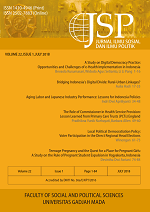Tunisia's Success in Consolidating Its Democracy One Decade Post-the Arab Spring
Ahmad Sahide(1*), Yoyo Yoyo(2), Ali Muhammad(3)
(1) Department of International Relations, Universitas Muhammadiyah Yogyakarta (UMY), Indonesia
(2) Arabic Language and Literature Study Program, Faculty of Islamic Studies, Universitas Ahmad Dahlan (UAD), Yogyakarta, Indonesia.
(3) Department of International Relations, Universitas Muhammadiyah Yogyakarta (UMY), Indonesia.
(*) Corresponding Author
Abstract
The political turmoil in Tunisia at the end of 2010 opened the door to the democratization of Arab countries. This event, widely known as The Arab Spring, presented a dream for the Arab community to live a better life under a democratic system. However, after a decade of progress, only Tunisia has succeeded in consolidating its democracy among the Arab countries that have been affected by the political turmoil. This paper tries to read the success factors for Tunisia in consolidating its democracy by using the theory of democracy from Robert Dahl, Jack Snyder, and Georg Sorensen. This study concludes that democracy in Tunisia is already included in the category of matured democracy according to Snyder's theory or has entered the category in which a democratic culture has begun to develop (Sorensen) and fulfills the elements of a democratic state according to Dahl. This success is inseparable from internal and external factors. The internal factor is the foundation of a civil society built before The Arab Spring and the openness of viewpoints of political actors after the political upheaval. Meanwhile, the external factor is the absence of America as the dominant actor in Tunisia because Tunisia is considered a ferry country. Tunisia also proves that Islam and democracy can go hand in hand, and this is a refutation of the pessimistic views of the scholars on Islam and democracy that can go hand in hand.
Keywords
Full Text:
PDFReferences
Aljazeera. (2019). Tunisia presidential election: Kais Saied declared winner. Retrieved from https://www.aljazeera.com / news/2019/10/14/tunisia-presidential- election-kais-saied-declared-winner
Angrist, M. P. (2011). Morning in Tunisia. The Frustrations of the Arab World Boil Over. In The Arab Revolt; What Happened, What It Means, and What Comes next (pp. 75–80). Foreign Affairs and Council on Foreign Relations.
Azhar, M., Sahide, A., & Hidayati, M. (2020). A New Perspective on Relations between Islam and Democracy in Indonesia. International Journal of Innovation, 13(5), 20.
Burdah, I. (2014). Islam Kontemporer, Revolusi dan Demokrasi. Intrans Publishing. Retrieved from https://opac.perpusnas.go.id/DetailOpac.aspx?id=870341
Corduneanu-Huci, C. (2019). Autocratic checks and balances? Trust in courts and bureaucratic discretion. Democratization, 26(4), 561–584. https://doi.org/10.1080/13510347.2018.1558213
Dahl, R. (1971). Polyarchy: Participation and Opposition. Yale University Press.
Dandashly, A. (2018). EU democracy promotion and the dominance of the security–stability nexus. Mediterranean Politics, 23(1), 62–82. https://doi.org/10.1080/13629395.2017.1358900
Deane, S. (2013). Transforming Tunisia The Role of Civil Society in Tunisia’s Transition. International Alert, 28.
EIU. (2019). Democracy Index 2019. Economist Intelligence Unit. Retrieved from https://www.eiu.com/n/campaigns/democracy- index-2019/
Freedom House. (2020). Global Freedom Status. Retrieved from https://freedomhouse. org/explore-the-map?type=fiw&year=2021&country=TUN
Hassouna, H. A. (2001). Arab Democracy: The Hope. World Policy Journal, 18(3), 49–52.
Haythem, G. (2020). How the West hollowed out the Tunisian revolution | Arab Spring | Al Jazeera. Retrieved from https:// www.aljazeera.com/opinions/2020/12/17/ western-media-and-academia-hollowed- out-the-tunisian-revolution
Hoppe, R., & Kassem, N. (2019). Civil Society Associations’ Efforts to Influence Post- Uprisings Governmental Policymaking in Three Arab States: A Regimes-Triad Approach. International Journal of Public Administration, 1–17. https://doi.org/10.1080/01900692.2019.1676257
Human Rights Watch. (2020). World Report 2021 | Human Rights Watch. Human Rights Watch. Retrieved from https://www.hrw. org/world-report/2021
Huntington, S. P. (1996). Prospek Demokrasi. In Perbandingan Politik (Keenam). Jakarta: Penerbit Erlangga.
Indonesia, V. (2006). Hamas Menang Besar Dalam Pemilu Palestina. VOA Indonesia. Retrieved from https://www.voaindonesia.com/a/a-32-2006-01-27-voa1-85242087/38508.html
Jamshidi, M. (2014). The Future of Arab Spring. Civic Entrepreneurship in Politics, Art, and Technology Startups. Elsevier Inc. Retrieved from https://www.amazon.com/ Future-Arab-Spring-Entrepreneurship- Technology/dp/0124165605
Khosrokhavar, Farhad. (2013). Obstacles to Democracy after the New Arab Revolutions: The Tunisian and Egyptian Cases. Oxford Islamic Studies Online, 10.
Krouse, R. W. (1982). Polyarchy & Participation: The Changing Democratic Theory of Robert Dahl. Polity, 14(3), 441–463. https:// doi.org/10.2307/3234535
Lavie, L. (2019). Consensus vs. dissensus over the ‘civil state’ model: A key to understanding the diverse outcomes of the Arab Spring in Egypt and Tunisia. British Journal of Middle Eastern Studies, 1–18. https://doi.org/10.1080/13530194.2019.1651631
Masoud, T. (2018). Review Essay: Why Tunisia?. Journal of Democracy, 29(4), 166-175.
Pavehouse, Jon C. (2005). Democracy From Above, Regional Organization and Democratization. Cambridge University Press. Retrieved from https://www.cambridge.org/core/ books/democracy-from-above/4C56863CF58AFD743727777858F4F778
Refle, J.-E. (2016). Tunisian civil society and international links. Retrieved from https://www.academia.edu/25085260/Tunisian_civil_society_and_international_links
Sadiki, L. (2014). Tunisia’s constitution: A success story? Retrieved from https:// www.aljazeera.com/opinions/2014/1/27/ tunisias-constitution-a-success-story
Sahide, A. (2017). The Arab Spring and Democratization; Why is Syria Different? JURNAL SOSIAL POLITIK, 3(2), 1–20. https://doi.org/10.22219/sospol.v3i2.5064
Sahide, A. (2019). The Arab Spring; Tantangan dan Harapan Demokratisasi. Jakarta: Penerbit Buku Kompas.
Selim, G. M. (2013). Global and Regional Approaches to Arms Control in the Middle East. A Critical Assessment from the Arab World. Springer. Retrieved from https://link.springer.com/book/10.1007/978-3-642-29314-6
Snyder, J. (2003). Dari Pemungutan Suara ke Pertumpahan Darah. Jakarta: Kepustakaan Populer Gramedia.
Sorensen, G. (2008). Democracy and Democratization, Processes and Prospects in a Changing World. Westview Press.
Tilly, C. (2007). Democracy. UK: Cambridge University Press.
United Nations Development Programme. (2021). Human Development Reports. Retrieved from http://hdr.undp.org/en/ indicators/101406
Article Metrics
Refbacks
- There are currently no refbacks.
Copyright (c) 2022 Jurnal Ilmu Sosial dan Ilmu Politik

This work is licensed under a Creative Commons Attribution-NonCommercial-NoDerivatives 4.0 International License.






















